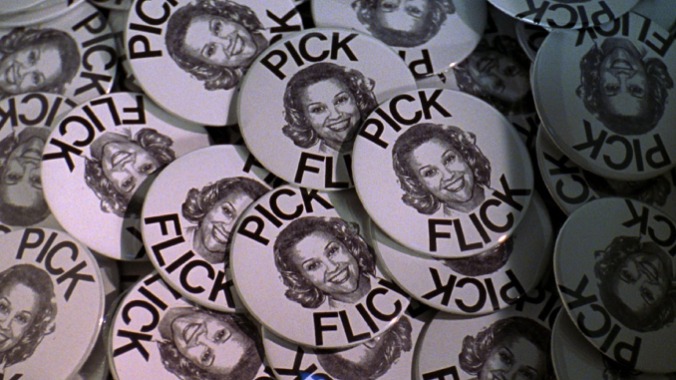Election’s Disaffection and False Dichotomies Still Resonate, 25 Years Later

Election begins with a focus on a sprinkler. Before we see it, we hear it: the sprinkler’s cycle rotates between a stream of water just spurting forward and water gushing across a school field. Matthew Broderick and Reese Witherspoon’s names overlay the image—an image that’s at once static yet elliptical in nature. The title card is superimposed on the screen, Election’s whimsical quasi-operatic score begins to play, and we move on.
It’s a clever image—one that’s phallic and silly, and more importantly, indicative of the psychosexual notes in Election, particularly as a picture that follows the ethically questionable lens of Jim McAllister (Broderick), a teacher who all but refuses to admit that he has a hard-on for vengeance as much as he has a hard-on for Type A student Tracy Flick (Witherspoon). As the credits roll, we follow the pathetic U.S. history teacher running on the campus field and struggling in his odyssey to complete three push-ups.
Election, perhaps unlike other comedic fare, doesn’t feel the need to adopt any moral lens; it instead embraces depicting the human propensity for utter repulsiveness. Think of some of our most successful recent studio comedies: Films like Bridesmaids, Blockers and Superbad detail the more unseemly sides of its characters but are also reliant on the audience empathizing with its leads. We see ourselves in Kristen Wiig, Kathryn Newton and Jonah Hill—no matter how badly they (or perhaps because they) fuck up, and we see ourselves in them when they make amends too. Each film ends with a reconciliation between its characters rather than in quasi-unresolved mistrust, as in Election. Election isn’t interested in its audience having an affinity for any of its characters or in neat endings; it’s interested in constructing characters with paradoxical, complicated, disorderly aims. In doing so, it penetrates our worst impulses and questions the narratives we concoct to conceal them.
Just as it follows a litany of lenses—each as deceptive and nearsighted as the next—Election inspires a litany of responses. It primarily pivots between the viewpoints of Jim and Tracy, who each embody different sides in Carver High School’s student body election—with Jim persuading dimwitted football player Paul Metzler (Chris Klein) to run against Tracy in what amounts to a pretty straightforward critique of the myopia and moral rot entrenched within U.S. politics.
But Election is more than this. It’s a study of the short-sightedness of dichotomous thinking altogether. Tracy claims Coca-Cola is the top soda in the U.S.; Jim cracks open a can of Pepsi in his basement as he pitifully scrutinizes the cheerleader-football player adult film he pretends to not be turned on by (even to himself). Jim feels threatened by the prospect of a Flick-led “dictatorship” at Carver High, so he enlists Paul for a Metzler-led “democracy”—“the kind [he] talks about in class” to his students.
Each character in Election is mired in their own viewpoint, and director Alexander Payne etches the film’s character dynamics according to this, as a series of dichotomies: Jim and Tracy, Tracy and Paul, and so on. Payne and co-writer Jim Taylor’s approach to character construction lends itself to the characters’ myopic choices, as they make decisions based on ludicrous one-sided rivalries and perceived feuds all in accordance with a logic that can’t seem to think itself out of a binary. This is essential to Election’s biting, critical farce.
“Let’s say all you ever knew were apples,” Jim says to Paul midway through the film. “Apples, apples, more apples. You might think apples were pretty good, even if you got a rotten one once in a while. But then one day, there’s an orange. And now you can make a decision. Do you want an apple or an orange? That’s democracy.”
-

-

-

-

-

-

-

-

-

-

-

-

-

-

-

-

-

-

-

-

-

-

-

-

-

-

-

-

-

-

-

-

-

-

-

-

-

-

-

-








































